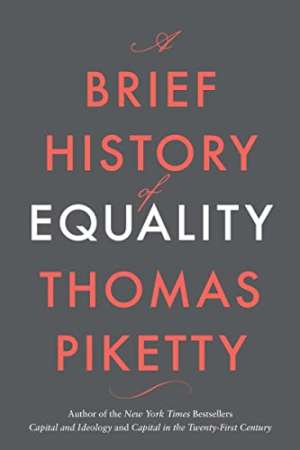25 July 2022
A Brief History of Equality
Thomas Piketty
2022, Belknap Harvard, 274 pages,
ISBN 9780674273559
Reviewer: Kevin Gardiner, Rothschild & Co/Cardiff Capital Region Econ Growth Partnership

Professor Piketty needs no introduction to SPE members. Despite its title, his latest book is as much manifesto as history.
The history follows the lines traced by the measured inequality of outcomes for income and wealth, with digressions into electoral representation, slavery and education. Taxation and redistribution policies are placed in context: Piketty reminds us that high marginal tax rates did not suddenly arrive in the 1970s – less convincingly, he also asserts that such high rates can and should return.
He notes that measured inequality of income and wealth (and of electoral enfranchisement) seems to have fallen in modern times. However, this “real, long-term tendency toward equality… is nonetheless limited in scope” (p2), and the aim of the book is to argue that “the battle for equality” (p226) can go further. The means to that end is “democratic socialism, participatory and federalist, ecological and multicultural” (p226). Indeed, “… the whole of international organization… must be rethought” (p218) in pursuit of “the gradual de-commercialization of the economy” (p164).
France understandably features prominently in his narrative, a nice reminder that there is more to the developed world – and its perceived shortcomings – than the Anglo-Saxon economies. I didn’t know about France’s post-war inflation (p147, with a striking debt/GDP chart p148). I had forgotten that it too is coming to terms with the legacy of slavery – and that when Britain and France abolished slavery, compensation was paid to the owners. (I was not convinced however by his arguments for reparations and what he calls “the logic of remedial justice”: how do we decide which historic crimes to redress?)
I think he could have written more about data sources, and how he is able to be so precise about the distribution of incomes and wealth in the nineteenth century and earlier. I think life today probably is less polarised, but can we be confident about the extent and timing of changes?
I also wonder if he has thought carefully about deeper democratic participation. Coherent public choice is difficult (impossible, even: see Arrow), and democracy is surely about satisficing, not optimising. Not everyone wants to share in all decision-making anyway (see Peter Cook’s “The Rise and Rise of Michael Rimmer” for what would happen if they did).
More generally, Piketty might have offered a more careful discussion of the notion of inequality itself, and exactly why it matters. Is it necessarily bad? He does not distinguish between opportunities, outcomes, abilities, efforts and indeed fortunes (that is, luck): for him, redistribution is always right.
He has no interest in how the economic cake comes to be baked, and sees no constraint on how it might be re-sliced. But this is the rock on which his redistributive project founders. We can’t redistribute what we haven’t got, and at some unknown point the cake will start to shrink. To believe it won’t is the economic equivalent of believing the world is flat.
He refers to a post-1980 rebound in inequality as “difficult to justify by considerations of incentives or efficiency” (p158). I agree. But he imagines a world in which we choose neatly from a range of smoothly-progressive, clearly-defined options. In reality we muddle through, making piecemeal reforms in a lumpy world characterised by party slates and corner solutions. Tolerating unfair slices of the cake may be the price we pay to make sure more people get fed.
Inequality is often confused with poverty. Before university I worked briefly for the Department of Health and Social Security, helping to administer means tests for Supplementary Benefit, the non-contributory benefit that was the effective poverty line. It was blurred, but there was (and still is) an important distinction between poverty and inequality.
